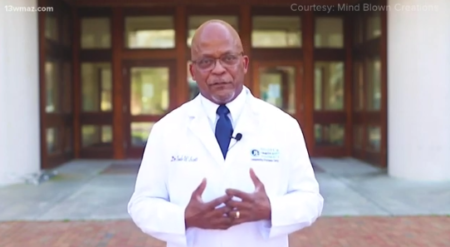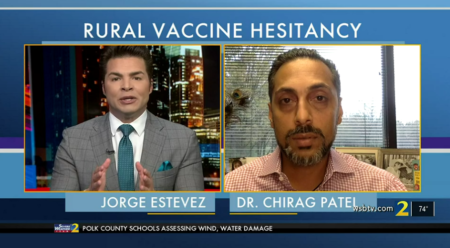Dr Google gets it right, McRib antidote, Captain Obvious takes heart, and more
31 Mar 2021
Posted by Andrew Kantor
Last chance to help pass SB46
The Georgia General Assembly ends at midnight tonight — today is your last chance to contact your state representative and senator and urge them to vote for SB46. If you haven’t done that, please pick up the phone now!
Point out:
- No, SB46 does not require anyone to be vaccinated.
- No, SB46 does not violate HIPAA — it actually strengthens patient information protection!
- SB46 does not allow a child to be vaccinated without their parents’ permission. In fact, the bill limits when children can receive vaccines and parental permission is expressly required.
What SB46 actually does: SB46 would authorize pharmacists and nurses to administer all ACIP-approved vaccines under the state’s protocol. Simply put: Allowing pharmacists to provide those vaccines is good for Georgia patients and in the interest of public health.
The pandemic has shown what a critical role pharmacists play — now it the time to build on that!
Contact info
Your state representative: Click here to find their contact info.
Your state senator: Click here to find their contact info.
Don’t know who they are? Find them easily with Openstates.
Doctor Google might not be that bad
Everyone knows you don’t get real medical advice from Dr. Phil, Dr. Oz, or Dr. Google … right? Maybe not. It turns out (per a Harvard study) that not only does ‘symptom-searching’ actually help diagnose a condition, people don’t freak out and convince themselves they have some horrible disease.
In fact…
The results showed a slight uptick in diagnosis accuracy, with an improvement of 49.8% to 54% before and after the search. However, there was no difference in triage accuracy or anxiety.
“We did not observe the often-touted ‘cyberchondria’. That is, after search, folks were not more anxious and heading to the emergency room for care.”
Fighting vaccine hesitancy
Now that I think about it
The wait-and-see-ers have waited and seen, and vaccine hesitancy is continuing to drop. Now only about 20 percent of Americans say they won’t get one. And against all logic, getting vaccinated remains a partisan issue.
Shout-out
…to Wade Scott of Scott’s Healthmart Pharmacy, who not only offers Covid-19 tests and vaccines, but is now working with his central Georgia community to get more people to overcome their reluctance.

And Wellstar, too
Wellstar’s Chirag Patel was also pushing the importance of the vaccine — he was on WSB-TV talking about the need for everyone to get the shot. “We’re a community of Georgians. We all need to turn to each other.”

Kids, depression, and the thyroid
If you’ve got adolescent patients dealing with depression, you might suggest a thyroid test. A study out of Germany found that 11 to 19 year olds with depression have an “increased risk for subclinical hypothyroidism and thyroid autoimmunity.”
Want to live forever?
Restricting your diet is a well-known way to increase your lifespan, but for many of us that’s a non-starter (especially when McRib is in season).
But now Japanese scientists may have found a cheat code: selenium.
Restricted (and vegan) diets work in large part because they cut down on the amino acid methionine. But that means no McRib. Methionine works by decreasing the IGF-1 hormone, so why not find another way to cut the IGF-1?
Wellllll, guess what does that?
For both male and female mice of any age, the authors found that selenium supplementation completely protected against the dramatic weight gain and fat accumulation seen in mice fed the control diet, and to the same extent as restricting methionine.
And lifespan? They tested yeast, and found that selenium supplementation increased its lifespan by 62-bleepin’-percent — from 13 days to 21 days. That means selenium could let you live to 130 years old*.
* Probably not.
Captain Obvious takes a nap
People who have a heart attack, then go back to working long hours, are at higher risk for a second heart attack.
A secret of food poisoning
Salmonella has the better publicist, but chances are the food poisoning you got from Uncle Rufus’s undercooked chicken was caused by campylobacter. And Washington State University researchers have uncovered a major clue to treating the infection.
Campylobacter secretes a protein called CiaD, which — they WSU folks discovered — it needs to attack cells. With this bit of knowledge, they’ve got a blueprint toward finding treatments and potentially even a vaccine.
Fresh fodder for sci-fi writers
For the first time, scientists have created an artificial cell that grows and replicates normally. They inserted synthetic DNA — fewer than 500 genes — into an existing bacteria whose DNA had been destroyed, and voilà, they grew and divided.
The earlier attempts at synthetic life created living cells, but they didn’t replicate properly. Adding seven genes fixed the problem … but the scientists only know what two of those new genes actually do.


